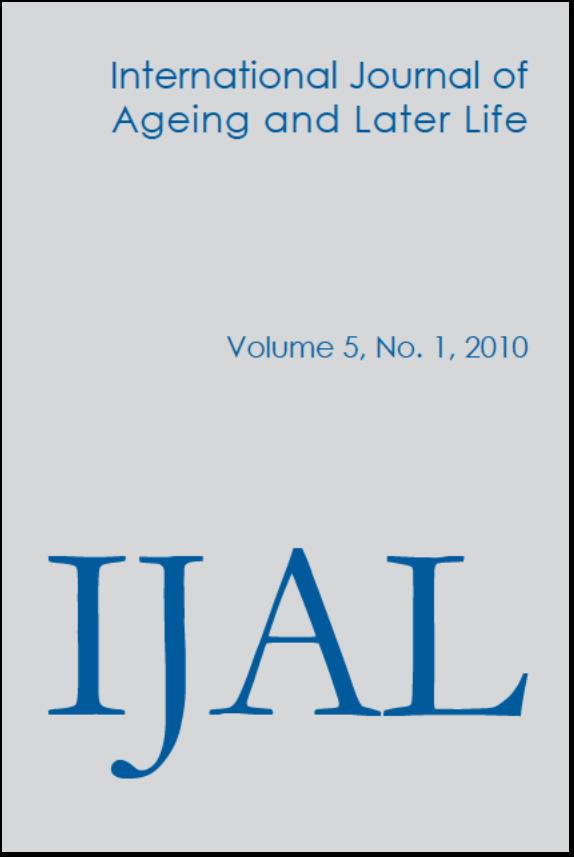Ageing societies and the welfare state: where the inter-generational contract is not breached
Main Article Content
Metrics
Article Details

This work is licensed under a Creative Commons Attribution-NonCommercial 3.0 Unported License.
Since 2020 the International Journal of Ageing and Later Life uses a Creative Commons: Attribution license, which allows users to distribute the work and to reform or build upon it without the author's permission. Full reference to the author must be given.
References
Attias-Donfut, C. & Arber, S. (2000). Equity and solidarity across the generations. In S. Arber & C. Attias-Donfut (eds.), The Myth of Generational Conflict. The Family and State in Ageing Societies (pp. 1–21). London: Routledge.
Bonoli, G. (2005). The politics of the new social policies: Providing coverage against new social risks in mature welfare states. Policy & Politics 33(3): 431–449. [Read this article]
Busemeyer, M. R., Goerres, A. & Weschle, S. (2009). Attitudes towards redistributive spending in an era of demographic ageing: The rival pressures from age and income in 14 OECD countries. Journal of European Social Policy 19(3): 195–212. [Read this article]
Dautzenberg, M. G. H., Diederiks, J. P. M., Philipsen, H., Stevens, F. C. J., Tan, F. E. S. & Vernooij-Dassen, M. J. F. J. (2000). The competing demands of paid work and parent care. Middle-aged daughters providing assistance to elderly parents. Research on Aging 22(2): 165–187. [Read this article]
Esping-Andersen, G. (2002). A new gender contract. In G. Esping-Andersen, D. Gallie, A. Hemerijck & J. Myles (eds.), Why We Need a New Welfare State (pp. 68–95). Oxford: Oxford University Press. [Read this article]
Eurostat (2008). Ageing characterises the demographic perspectives of the European societies. Statistics in Focus – Population and Social Condition 72.
Ginn, J. & Arber, S. (2000). Gender, the generational contract and pension privatization. In S. Arber & C. Attias-Donfut (eds.), The Myth of Generational Conflict. The Family and State in Ageing Societies (pp. 133– 153). London: Routledge.
Goldstein, J. R. (2009). How populations age. In P. Uhlenberg (ed.), International Handbook of Population Aging (Vol. 1, pp. 7–18). New York: Springer. [Read this article]
Izuhara, M. (2002). Care and inheritance: Japanese and English perspectives on the ‘generational contract’. Ageing & Society 22(1): 61–77. [Read this article]
Kabeer, N. (2000). Inter-generational contracts, demographic transitions and the ‘quantity-quality’ tradeoff: Parents, children and investing in the future. Journal of International Development 12: 463–482. [Read this article]
Lima, J. C., Allen, S. M., Goldscheider, F. & Intrator, O. (2008). Spousal caregiving in late midlife versus older ages: Implications of work and family obligations. The Journals of Gerontology: Social Sciences 63B(4): S229–S238.
McGregor, A. J., Copestake, J. G. & Wood, G. D. (2000). The intergenerational bargain: An introduction. Journal of International Developelopment 12: 447–451. [Read this article]
O’Rand, A. M. & Shuey, K. M. (2007). Gender and the devolution of pension risks in the US. Current Sociology 55(2): 287–304. [Read this article]
Organisation for Economic Co-operation and Development (2006). Ageing and Employment Policies: Live Longer, Work Longer. Paris: OECD.
Schmähl, W. (2007). Dismantling an earnings-related social pension scheme: Germany’s new pension policy. Journal of Social Policy 36(2): 319–340. [Read this article]
Svallfors, S. (2008). The generational contract in Sweden: Age-specific attitudes to age-related policies. Policy & Politics 36(3): 381–396. [Read this article]
United Nations (2009). World Population Ageing 2009. New York: United Nations.
Walker, A. (1996). Intergenerational relations and the provision of welfare. In A. Walker (ed.), The New Generational Contract. Intergenerational Relations, Old Age and Welfare (pp. 10–36). London: UCL Press.
Walker, A. (2000). Public policy and the construction of old age in Europe. The Gerontologist 40(3): 304–308.





